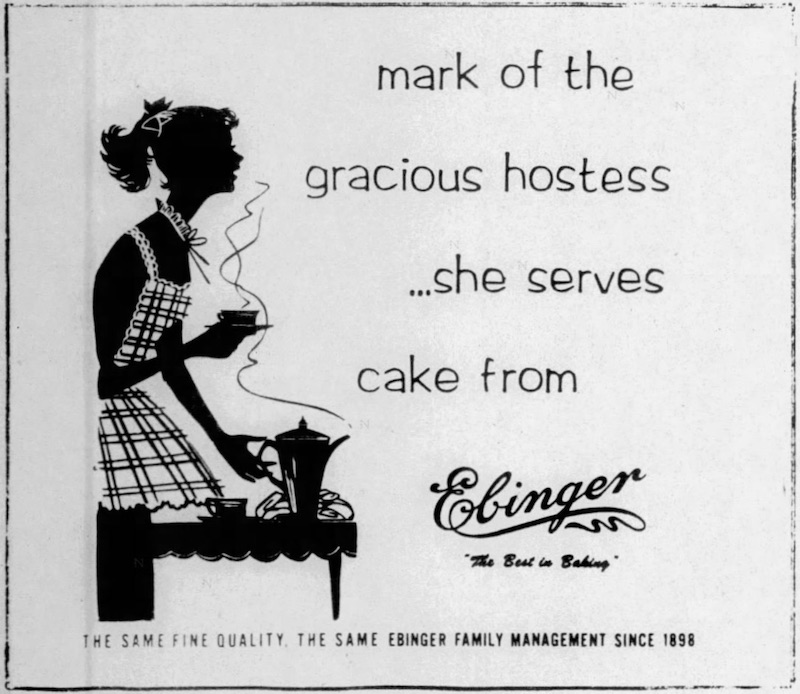 [An Ebinger’s bakery, 411 86th Street, Brooklyn, New York, c. 1939–1941. From the NYC Municipal Archives Collections. Click for a much larger view.]
[An Ebinger’s bakery, 411 86th Street, Brooklyn, New York, c. 1939–1941. From the NYC Municipal Archives Collections. Click for a much larger view.]
George Ebinger (1859–1935) opened a bakery in the Flatbush section of Brooklyn in 1898. By 1915, when he retired, he had three stores. By 1930, when the chain was run by his sons, there were forty. By 1950, forty-two. When the chain went into bankruptcy in 1972, there were fifty-four or sixty-seven locations in Brooklyn and Queens and on Long Island, depending on which source you consult.
It matters not that the sign says Ebinger Bakers ; a Brooklynite went to an Ebinger’s for baked goods. I remember blackout cake and crumbcake. My brother remembers pot pies. Everything was boxed in pale green boxes with brown squiggly lines, and tied with string — brown and white, I think.
The dowdy world took its baked goods seriously. Consider the list of breads in a 1963 Ebinger’s advertisement: pan twist, Pullman, raisin, plain rye, seed rye, smooth top, white mountain, whole wheat, whole wheat raisin, and unsalted white, “all in new re-closable package!”
Ebinger’s was enough a part of Brooklyn reality that it turns up in Gilbert Sorrentino’s novel of Brooklynites, Aberration of Starlight (1980):
What tradition did he keep with religious devotion?
On New Year’s Day, he visited all his surviving relatives to wish them the joy of the new year; at home, he made certain that he had on hand a supply of ladyfingers (bought at Ebinger’s Bakery) and a bottle of sherry with which to refresh any guests who dropped in to wish him and the family the joy of the new year.
See?
Ebinger’s, possessive.

[
Kings Courier, July 6, 1963. Click for a larger view.]
A
New York Times article about the end of Ebinger’s (August 26, 1972) quotes Arthur D. Ulrich, the company’s president and George Ebinger’s grandson: “In these days quality cake has perhaps become a luxury that somehow does not fit into the housewife’s budget.” “Cake,” he says, “has been pushed into the luxury class.” But the article also notes that most of the chain’s customers “had moved from Brooklyn and Queens to Nassau and Suffolk Counties.”
In 1982 the
Times reported that a Brooklyn bakery had resurrected the Ebinger name and was thriving, with the blessing of, and original recipes from, George Ebinger’s son Arthur Ebinger. But there’s no sign of that bakery now.
Some other Ebinger’s locations:
1104 Kings Highway,
1707 Kings Highway,
1310 Avenue J,
1704 Avenue M, and
1603 Avenue U. The Ebinger’s our family patronized, at 4907 13th Avenue, is barely discernible in
this photograph. It’s to the right of the bank.
All Ebinger’s locations are now located in Brooklyn memory banks.

[
Canarsie Courier, October 28, 1993.]
Thanks, Brian.
*
October 18, 2023: An article in the
Daily News,
“Will the real Ebinger’s please stand up?” (September 22, 1982), casts doubt on the claim that Arthur Ebinger gave his family’s recipes to Lou Guerra, the baker who revived the Ebinger’s name. The article quotes Carolyne Ebinger Czap, Arthur’s daughter:
“What makes me sad,” said Czap, “is that people think these awful things are what my father made. I doubt seriously that Guerra ever met my father.”
Guerra says that Arthur Ebinger gave him the recipes in 1978.
“My father,” said Czap, “was in the hospital and a nursing home for two years before his death. He died in 1977.”
The article cites several sources who say that Guerra used mixes, not fresh ingredients. Ebinger’s used only fresh ingredients.
The
Times never revisited its story.
Thanks again, Brian.
Related posts
More photographs from the NYC Municipal Archives





